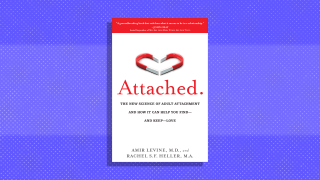
Despite being published more than a decade ago, "Attached: The New Science of Adult Attachment and How It Can Help You Find — and Keep — Love" is #4 on Amazon's social science books best seller's list.
This is partially because the book has gained some traction on TikTok, where the hashtag #attachmentstyles has 91.7 million views and #attachmenttheory has 142.4 million views.
In the book, author Dr. Amir Levine posits that children's attachment styles, first pioneered by John Bowlby in the 1950s, can be applied to romantic relationships between adults.
The three attachment styles, as defined in the book by Levine, are:
Get Tri-state area news and weather forecasts to your inbox. Sign up for NBC New York newsletters.
- Secure people feel comfortable with intimacy and are usually warm and loving
- Anxious people are often preoccupied with their relationships and tend to worry about their partner's ability to love them back
- Avoidant people equate intimacy with a loss of independence and constantly try to minimize closeness
"For the longest time I didn't even know about 'Attached' being so popular on TikTok," Levine says.
The book's enduring appeal, he says, is possibly because the world seems a lot scarier than it did 10 years ago. An isolating pandemic and deteriorating planet has made people focus more on themselves and their relationships. He also hopes that people just find it to be a good, helpful read.
Money Report
'Seismic shifts' happened in a lot of relationships
The book's popularity and the renewed interest in attachment theory is due to a confluence of two factors: people feeling less safe and being more online.
"A very important principle in attachment science is that periods of increased threat or danger can lead to activation of the attachment system," Levine says. "This causes our attention to shift more towards relationships."
Since early 2020, Covid-19 has been that threat. It's understandable that being cooped up at home — with a phone as your only window to the outside, while a mysterious, deadly virus ravaged the world — meaningfully changed people's lives.
"There's a lot less you can tolerate when you are faced with imminent harm than when the world feels generally safe," Levine says. "Seismic shifts happened to a lot of people in their relationships during the pandemic. Some close relationships, be it friendships or romantic ties, or at the workplace, dissolved and new close ones formed."
Levine would go as far as to say that climate change also played a role in his book's increased sales over the last couple years.
"I think because of climate change we're finding ourselves living in an increasingly more dangerous world, which means that close relationships become even more paramount and we will focus on them more," he says.
The teachings in the book are also "non-binary and gender neutral" he says, which means they can appeal to a larger swatch of people.
Ultimately, he hopes that the book's resurgence is due to people finding its content as revelatory as he did when he first learned it. "From the moment I came across this information it has changed my life and how I interact with people for the better," he says.
Many therapists, some of which have a TikTok following, feel the same way and use it with their patients.
'The book was so easy to read'
Pamela Larkin, a therapist who specializes in dating and relationships, read the book four years ago before starting her own private practice in Chicago. "To learn about attachment theory was eye-opening to me," she says. "It felt like a different way to understand people's needs and people's wounds."
To her, the book's popularity is partially due to the content but also its accessibility. "That book was so easy to read," she says. "It was written really well."
However, she could see people using the knowledge they glean from the book in ways that aren't totally helpful to them or their relationships.
Even though Larkin is a fan of the book, she says people should "approach it with some critical thinking."
How to apply the lessons from 'Attached' to your life
Only assign an attachment style to yourself. "You want to approach it with curiosity about yourself, and not curiosity about other people," she says. This doesn't mean you can't apply your findings about your attachment style to your relationships, though.
"If you want to think about a specific relationship, look more at the dynamics you see playing out that might mirror some of these attachment styles, but without assigning another person their attachment style," she says.
Use it to improve your own communication. Along with knowing your attachment style, ask yourself "How is my way of communicating getting in the way of me getting what it is I want or need."
The book explores effective communication strategies based on attachment types, Larkin says. It's not about avoiding people with certain attachment styles, but learning to communicate with them in a way that strengthens the relationship.
Remember, your attachment style can change. "Just like any other personality test I wrestle with when people stay stuck and rigid in that style," she says.
You will probably oscillate between a couple different styles throughout your life as you collect new experiences. But Larkin urges readers of the book to keep in mind that "this doesn't fully define who you are."
'We're not talking about health and disease'
Levine agrees that the book shouldn't be used to "pathologize other people."
For example, he says, those with anxious or avoidant attachment styles don't have an illness and shouldn't be treated like they do.
"We're not talking about health and disease," he says. "We're talking about a different way of relating."
He compares attachment styles to a physical trait. One is not better than the other.
"Just like some people have blue eyes and some brown, we're all different," he says. "But I wouldn't call someone with blue eyes sick just because they have blue eyes. There are advantages to having insecure attachment styles [anxious or avoidant] in certain circumstances. I don't think people with an insecure attachment style should get a bad rep."
Whether people are using the book in a healthy way, though, is out of his hands, he says, but he hopes for the best.
"Once you write something and put it out into the world you don't have control over it and how people may use it or even misuse it," he says. "You have to just accept that part, it's not always easy."
Sign up now: Get smarter about your money and career with our weekly newsletter






